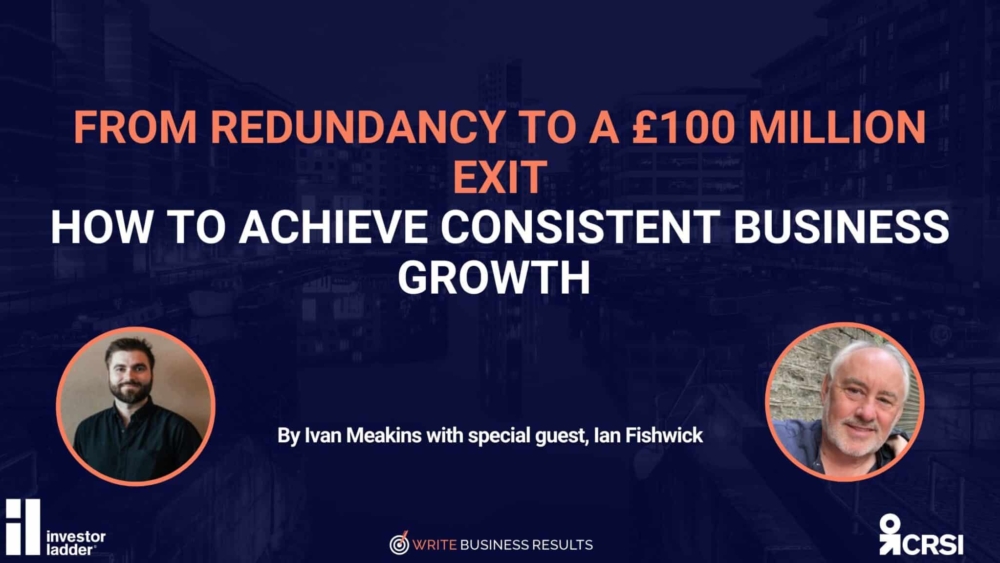By Ivan Meakins with Ian Fishwick
This blog has been taken from Episode 10 of the Climb podcast, a show that was recorded for the Climb23 event, hosted by Gordon Bateman and Investor Ladder.
Find the full conversation with Ian Fishwick here.
From double redundancies to a multimillion-pound exit
Ian Fishwick has had an unlikely road to success.
After facing back-to-back redundancies, he took a leap of faith by launching his business, AdEPT Technology, right from a spare bedroom.
At the time, this may have seemed like a risky move to anyone. But since then, he’s successfully completed over 40 mergers and acquisitions, been named UK CEO of the Year three times, and finally exited his business in a £100 million deal.
How did he do it?
In this blog, we’ll explore some of Ian’s tips on consistently winning in business and how you can prime your company for a successful exit.
Building team spirit
According to Ian, one of the cardinal rules for achieving consistent business growth is cultivating a shared dream across the team. There are two types of employees – people who work to pay the bills and hate their jobs, and people who actually love their jobs.
As a business owner, you achieve the latter once you create the notion that they’re doing something special or making a difference. When every team member feels integral to the company’s success, you begin to see growth.
Ian: “I think consistent growth is about being completely honest with people. For me, it got to a point where I would gather the top dozen people together and say, ‘For so long, each year has been better than the previous one. Do you actually want this to be the year where we lose the record?’
And then, we’d sit down and think of what we actually needed to do. It didn’t even matter if the year was ten pounds or a million pounds better than the previous year. What mattered is that we weren’t going backwards.
I believe that ultimately, you have to create the opinion that your team is doing something special and making a difference.”
Keeping ahead of the game
Ian: “When you’re running a technology business, the only thing that’s constant is change. This means that whatever products you’re building today probably won’t be the right ones in about three to five years.
That’s why you need to have some of your team members working on solutions for today while you’re constantly looking ahead, trying to predict future trends and spot problems early on.
I effectively reinvented my business three times. It started with lots of small businesses and then we moved to much bigger businesses and the public sector, and eventually, we became a much wider IT business. So, the key point here is that one idea won’t last you for 20 years.”
Ian raises an interesting point for any business owner, particularly those in tech. If you want to keep ahead of the game, you have to constantly innovate and move with the times.
But what does innovation actually mean? How do you innovate when things are moving so quickly?
Commercial innovation is as important as technical innovation
With the tech industry being so competitive, it’s hard to create a completely unique product. However, you can still communicate your value proposition in a different way and build a unique model for your target market.
Ian: “People tend to talk about technical innovation, but you need to have commercial innovation as well. If you’re selling a similar product to somebody else, try and do it a different way.
There are different ways of thinking about what you do. For example, British Aerospace reinvented the jet engine market when they introduced a pay-by-the-hour model instead of charging their customers a fortune upfront.”
A chicken tale: getting the small bits right
To truly win in your business year in and year out, it’s highly important to aim to be the most professional in your industry and keep your customers happy. Contrary to what most business owners think, this doesn’t mean you need to spend a fortune on new sales tactics and more products.
Sometimes, professionalism can be as simple as a £4 rotisserie chicken.
Ian: “One year, I was tasked to visit some top American companies recognised for their outstanding customer service. During my visit to a leading supermarket, I witnessed a remarkable lesson in customer service. A customer, upset about a burnt chicken, demanded a refund. The attendant declined because, according to him, she had already consumed the chicken. She eventually stormed off, vowing never to shop there again.
But then, the store manager walked in, and this is where it gets interesting. He began to calculate the potential lifetime value of that customer. Typically, an average customer might spend around £6000 annually. Over 30 years, that could be £180,000. So, in essence, they had lost £180,000 over a £4 chicken.
That’s a fantastic explanation of how you should always consider the lifetime value of a customer. There may be blips along the way, but when possible, give in on the little things.”
**
Has this blog given you further insights into what it takes to achieve consistent growth? For more tips from Ian, check out his book, The Street-Smart MBA – Mastering Business Acumen Without Going To School.
You can also find him on Episode 10 of the Climb podcast, sponsored by Investor Ladder. To find out more about Investor Ladder and upcoming events, click here.
If you enjoyed this blog or listened to the Climb podcast and wanted some advice on how to create regular thought leadership content for your business, get in touch with Write Business Results today.
